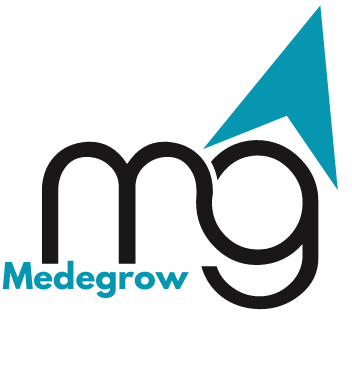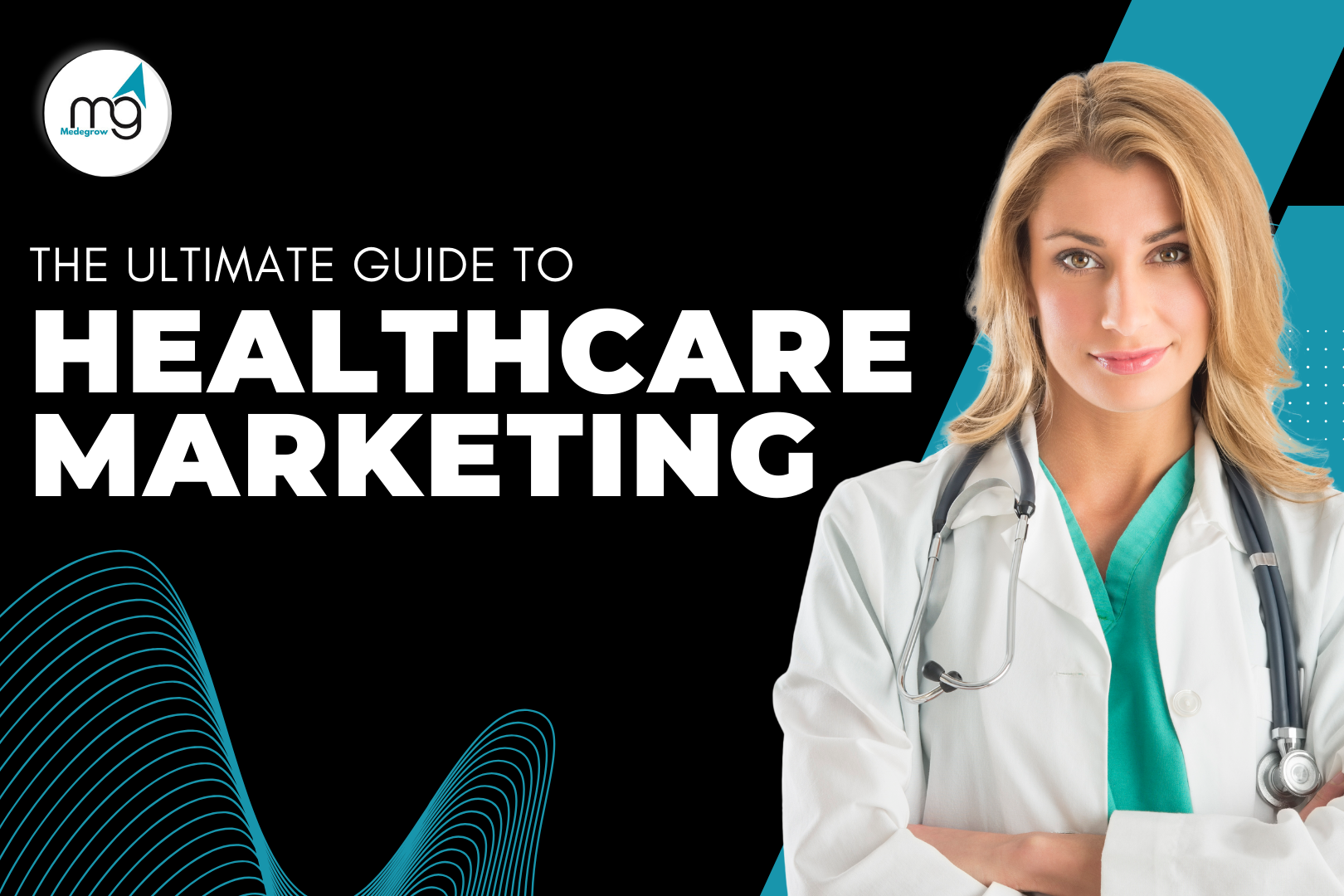
Healthcare is no longer just about providing excellent patient care—it’s about connecting with patients where they are: online. Marketing has become the backbone of modern healthcare practices, helping providers build trust, engage patients, and stand out in an increasingly competitive industry.
In this guide, we’ll explore what healthcare marketing is, why it’s crucial for healthcare providers, and the proven strategies to attract and retain patients while staying compliant with industry regulations. By implementing these strategies, you can elevate your practice to new heights of success and patient satisfaction.
What is Healthcare Marketing?
Healthcare marketing is the process of connecting healthcare providers with patients through strategic communication and engagement. It includes everything from digital advertising and social media campaigns to educational content and patient reviews.
Unlike traditional business marketing, healthcare marketing focuses heavily on:
Marketing bridges the gap between patients and providers, ensuring the right services reach the right people at the right time. This approach not only attracts new patients but also nurtures long-term relationships that contribute to sustained growth.
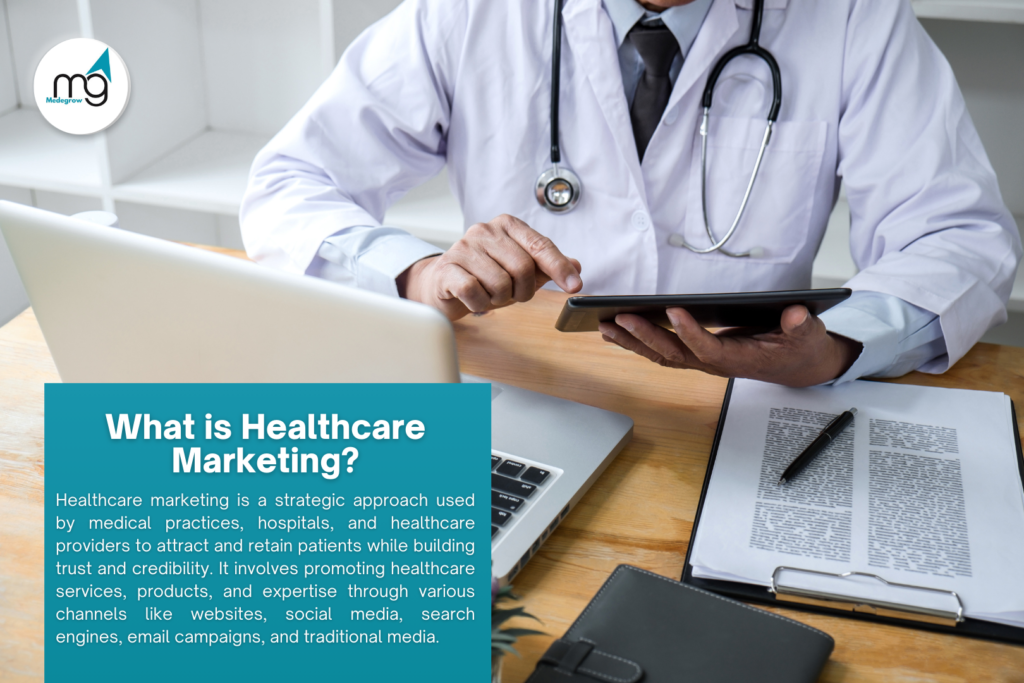
Why is Healthcare Marketing Crucial for Doctors and Practices?
The Rise of Digital-First Healthcare Consumers
Patients today start their healthcare journey online. From Googling symptoms to reading reviews, digital platforms are the go-to for finding healthcare providers. A strong online presence is no longer optional; it’s a necessity.
Key Benefits of Healthcare Marketing

Addressing Competition
With countless options available, marketing helps practices differentiate themselves. By highlighting unique strengths—such as advanced technology, personalized care, or specialized expertise—you can attract and retain loyal patients.
Adapting to Patient Expectations
Modern patients expect convenience, transparency, and responsiveness. marketing allows practices to meet these expectations by offering online appointment scheduling, telehealth options, and clear communication.
Proven Strategies for Effective Marketing
Search Engine Optimization (SEO)
SEO (Search Engine Optimization) is a critical aspect of digital marketing, acting as the foundation for online visibility. By optimizing your website and content, SEO helps ensure that your practice appears at the top of search engine results when potential patients are looking for healthcare services.
It involves a series of strategies, such as keyword research, on-page optimization, link-building, and improving user experience, all aimed at making your website more accessible and relevant to search engines like Google.
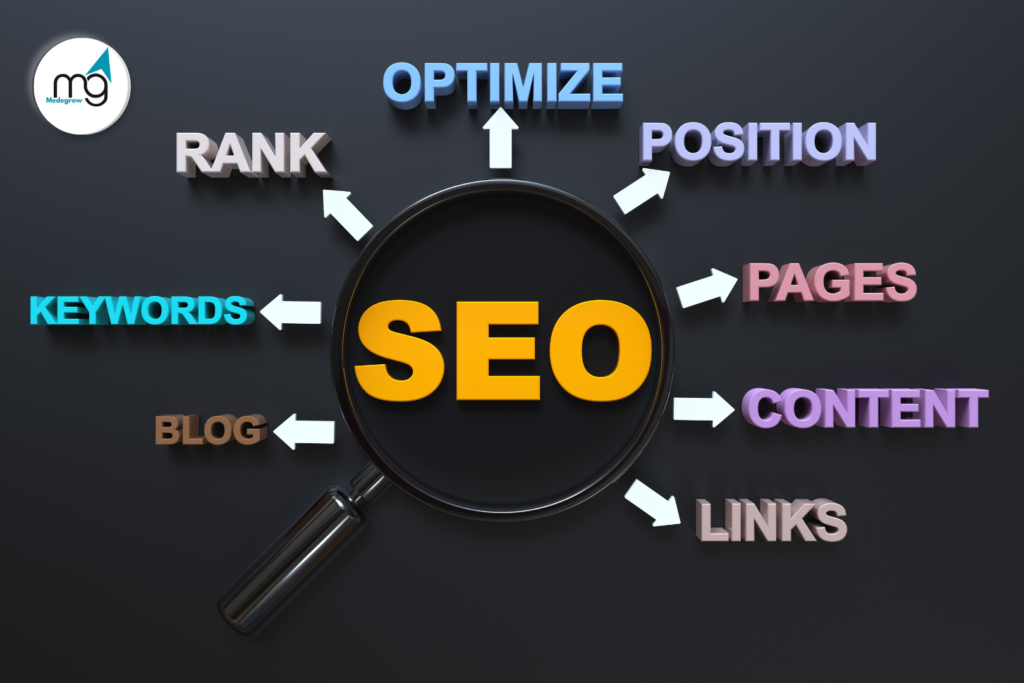
Content Marketing
Content marketing is a powerful tool that positions your practice as a trusted authority in the healthcare space. By creating and sharing high-quality, relevant content—such as blog posts, educational articles, videos, and infographics—you provide valuable information that addresses patients’ questions and concerns. This not only helps educate your audience but also demonstrates your expertise in specific medical areas..
Social Media Marketing
Social media platforms provide unparalleled opportunities for healthcare providers to engage with patients in a meaningful and direct way.
Through platforms like Facebook, Instagram, Twitter, and LinkedIn, you can interact with current and potential patients by sharing valuable content, responding to inquiries, and participating in conversations.
These platforms allow you to humanize your practice, showcase patient success stories, offer health tips, and create a sense of community.

Paid Advertising (PPC)
Paid advertising is a highly effective way to reach the right audience quickly, allowing healthcare providers to target specific demographics based on location, age, interests, and even behaviors.
Unlike organic methods, paid ads can immediately increase your visibility by placing your practice in front of potential patients who are actively searching for healthcare services.
Platforms like Google Ads, Facebook, and Instagram offer precise targeting options, ensuring that your ads are shown to the most relevant audience.
Also, check out our other blog on PPC for Doctors – learn how pay-per-click advertising can help doctors attract more patients and grow their practices!
Email Marketing
Email marketing is a cost-effective and efficient way to nurture patient relationships, providing a direct line of communication between your practice and your patients. By sending personalized and relevant emails, you can keep patients informed about new services, upcoming appointments, health tips, and special offers.
It allows you to stay top of mind and build ongoing engagement without the high costs associated with traditional marketing methods. Whether through newsletters, reminders, or post-visit follow-ups, email marketing fosters trust and loyalty by offering patients valuable information tailored to their needs.

Online Reputation Management
A strong online reputation is crucial for attracting new patients, as it directly impacts how potential patients perceive your practice. In today’s digital age, most patients research healthcare providers online before making an appointment.
Positive reviews, testimonials, and a well-maintained online presence can help build trust and credibility, making your practice stand out from competitors. A strong reputation not only reflects the quality of care you provide but also demonstrates your commitment to patient satisfaction.
Overcoming Challenges in Healthcare Marketing
Navigating Compliance
Healthcare marketing must adhere to strict regulations, such as HIPAA (Health Insurance Portability and Accountability Act), to ensure that patient privacy is protected and that all marketing practices are ethical.
Safeguarding patient data is a top priority, meaning that any personal or medical information shared in campaigns must be handled with the utmost care and security.

Building Trust
Misinformation can severely erode patient trust, which is essential for the success of any healthcare practice. To combat this, it’s crucial to create transparent, accurate, and engaging content that reflects your practice’s commitment to providing reliable information.
By addressing common patient concerns and offering clear, well-researched answers to frequently asked questions (FAQs), you can help patients feel informed and confident in their healthcare decisions.
Managing Negative Reviews
Negative feedback is an inevitable part of any business, including healthcare practices, but it is manageable with the right approach. Responding promptly and professionally to negative reviews or comments demonstrates your commitment to patient satisfaction and shows that you value patient input.
A timely and empathetic response can often turn a dissatisfied patient into a loyal one, as it highlights your dedication to resolving issues and improving the patient experience.
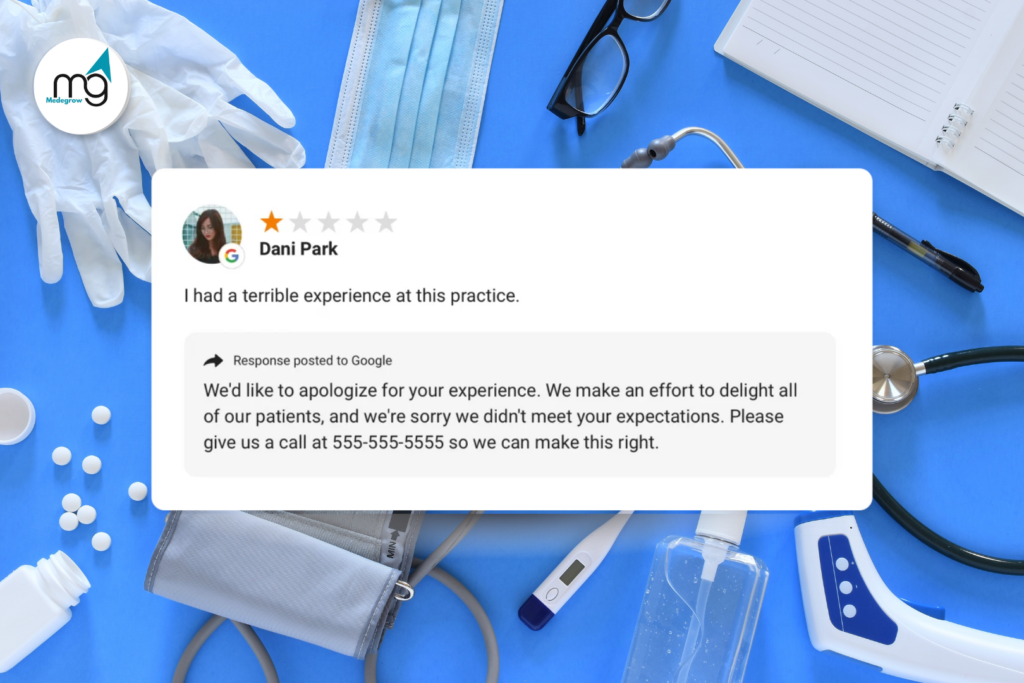
Measuring the Success of Marketing Campaigns
Key Metrics to Track
Tools to Use
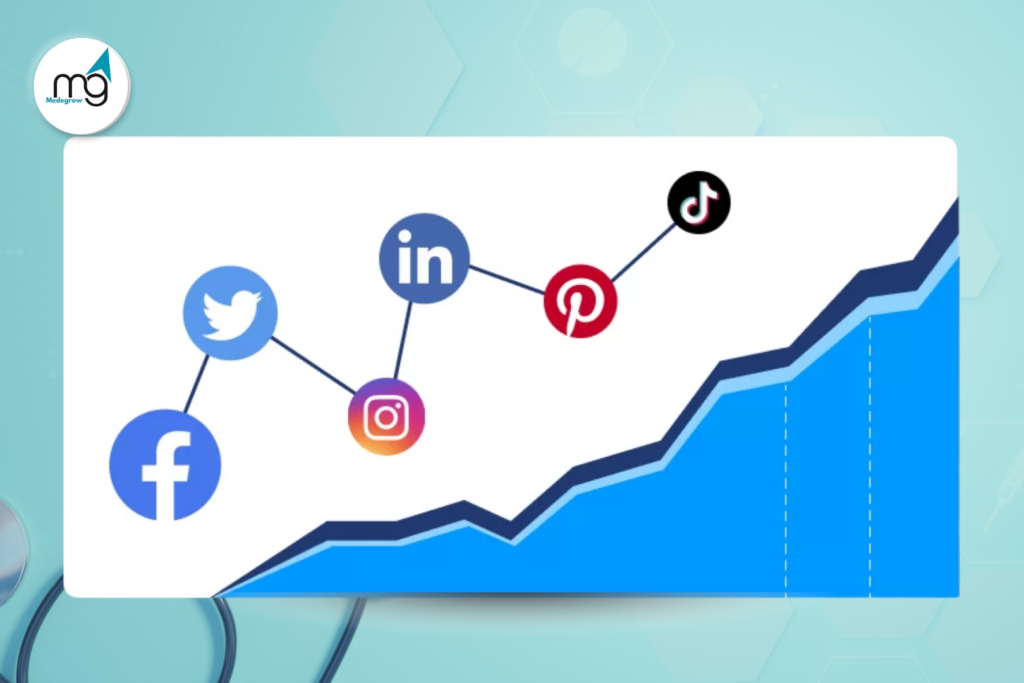
The Value of Partnering with a Healthcare Marketing Expert
Expertise in Healthcare Regulations
A specialized marketer plays a crucial role in ensuring that your healthcare marketing campaigns comply with industry rules and regulations, such as HIPAA and other legal requirements.
By partnering with an expert who understands the complexities of healthcare laws, you can minimize risks related to data breaches, legal liabilities, and non-compliance.
Tailored Strategies
Every healthcare practice is unique, with its own set of goals, target audience, and areas of specialization. Experts in healthcare marketing design customized strategies that are specifically tailored to meet the needs of your practice.
By taking the time to understand your practice’s values, objectives, and the demographics of your patients, they create marketing campaigns that resonate with your audience and reflect your specialty.

Proven Results
Case studies serve as powerful tools to showcase the tangible benefits of professional marketing in the healthcare sector. They highlight real-world examples of how marketing strategies have helped practices increase patient acquisition, improve online visibility, and foster stronger patient relationships.
For instance, a case study might demonstrate how a targeted SEO strategy led to higher search engine rankings, attracting more local patients to a clinic.
Conclusion Of Healthcare Marketing
Healthcare marketing is essential for practices to thrive in today’s digital-first world. By leveraging strategies like SEO, social media, content marketing, and paid ads, healthcare providers can significantly enhance their online presence, attract new patients, and build long-term trust.
These powerful tools not only help your practice stay competitive but also create sustainable growth by engaging patients with valuable information, personalized care, and responsive communication.
Ready to take your practice to the next level? Contact us today to learn how our healthcare marketing expertise can help you achieve your goals and ensure your practice’s success in the digital age.
FAQs About Healthcare Marketing
What makes healthcare marketing different from other industries?
Marketing involves strict compliance with regulations like HIPAA and prioritizes trust-building over sales tactics.
How can I ensure my Marketing complies with regulations?
Work with marketing professionals who understand the legal landscape and can create ethical campaigns.
What platforms are most effective for healthcare marketing?
Google for SEO and PPC, Facebook and Instagram for social engagement, and LinkedIn for professional networking.
How long does it take to see results from healthcare marketing?
SEO and content marketing can take 3-6 months, while PPC and social media ads often show immediate results.
Is social media safe for healthcare marketing?
Yes, as long as it complies with HIPAA and maintains professionalism.
How do I measure the ROI of Marketing?
Track leads, conversion rates, website traffic, and engagement metrics to evaluate campaign effectiveness.


